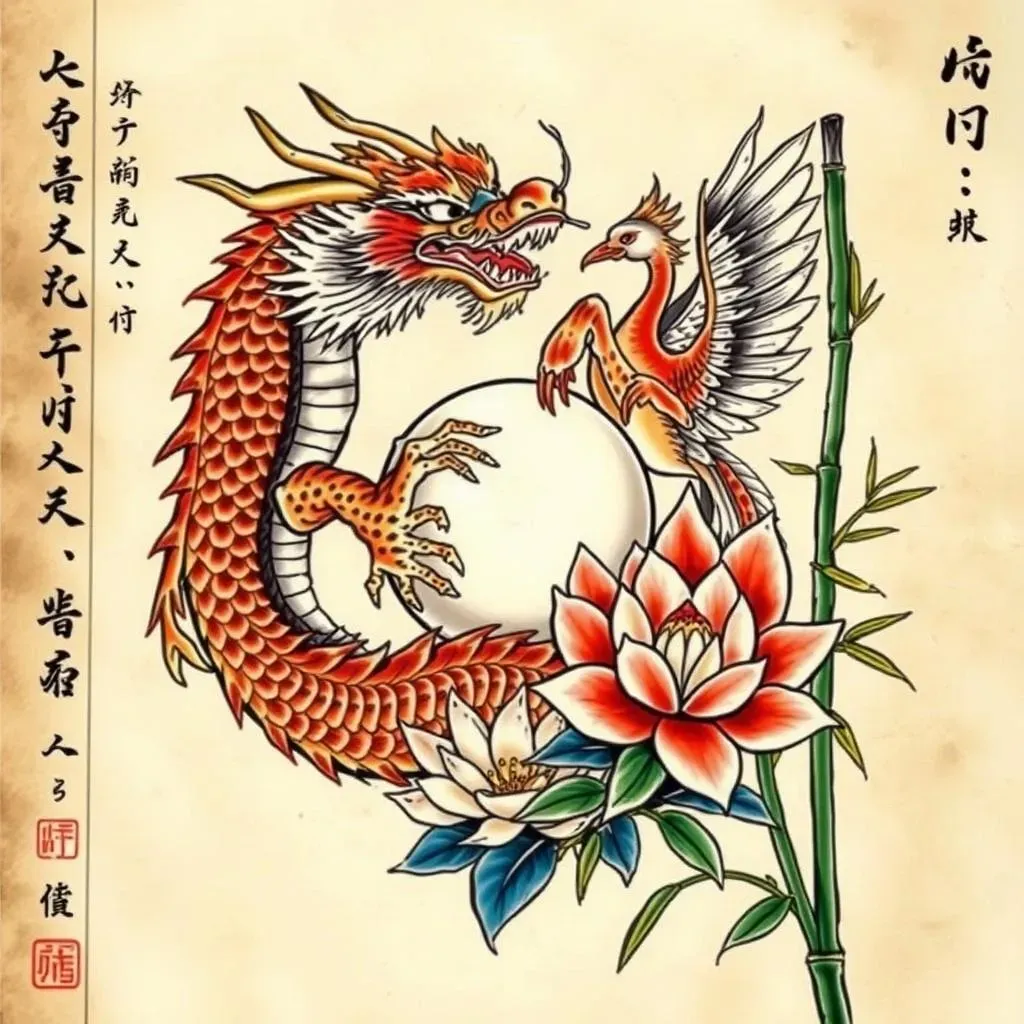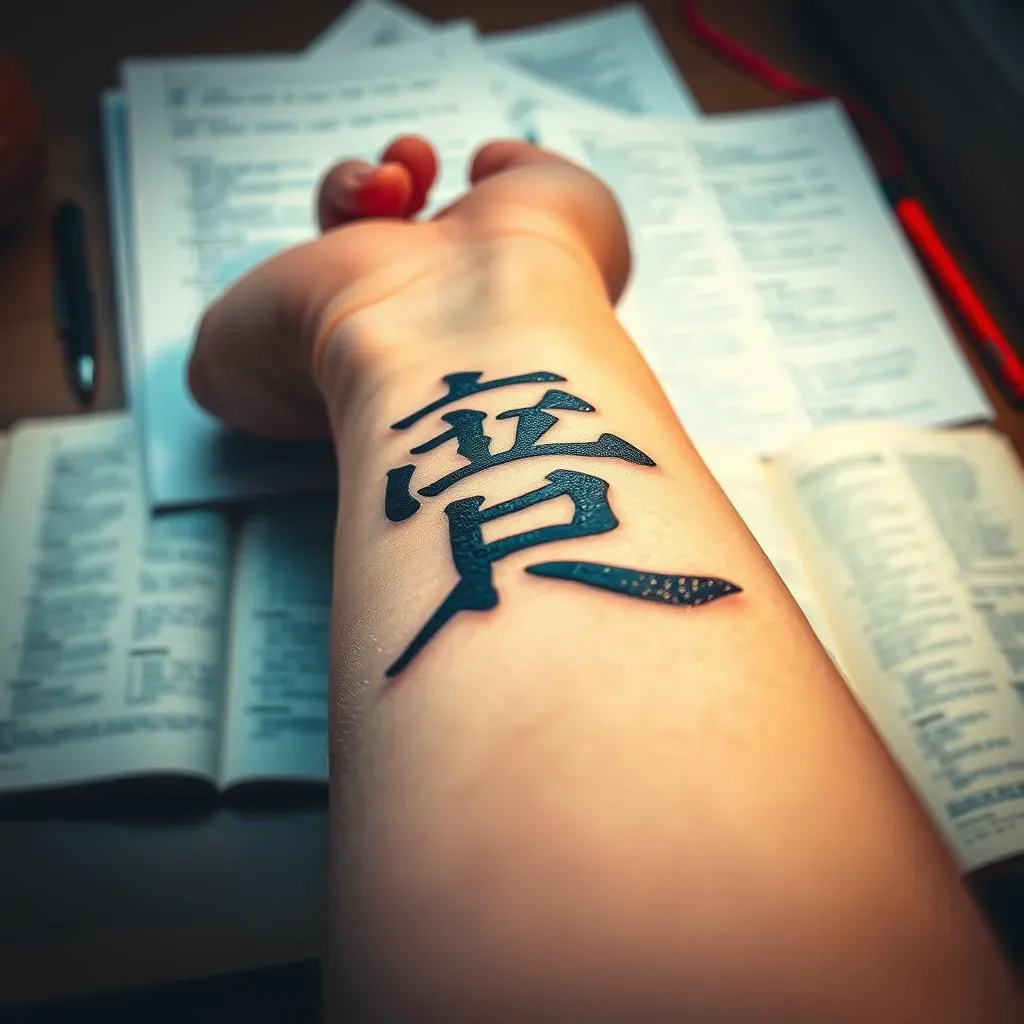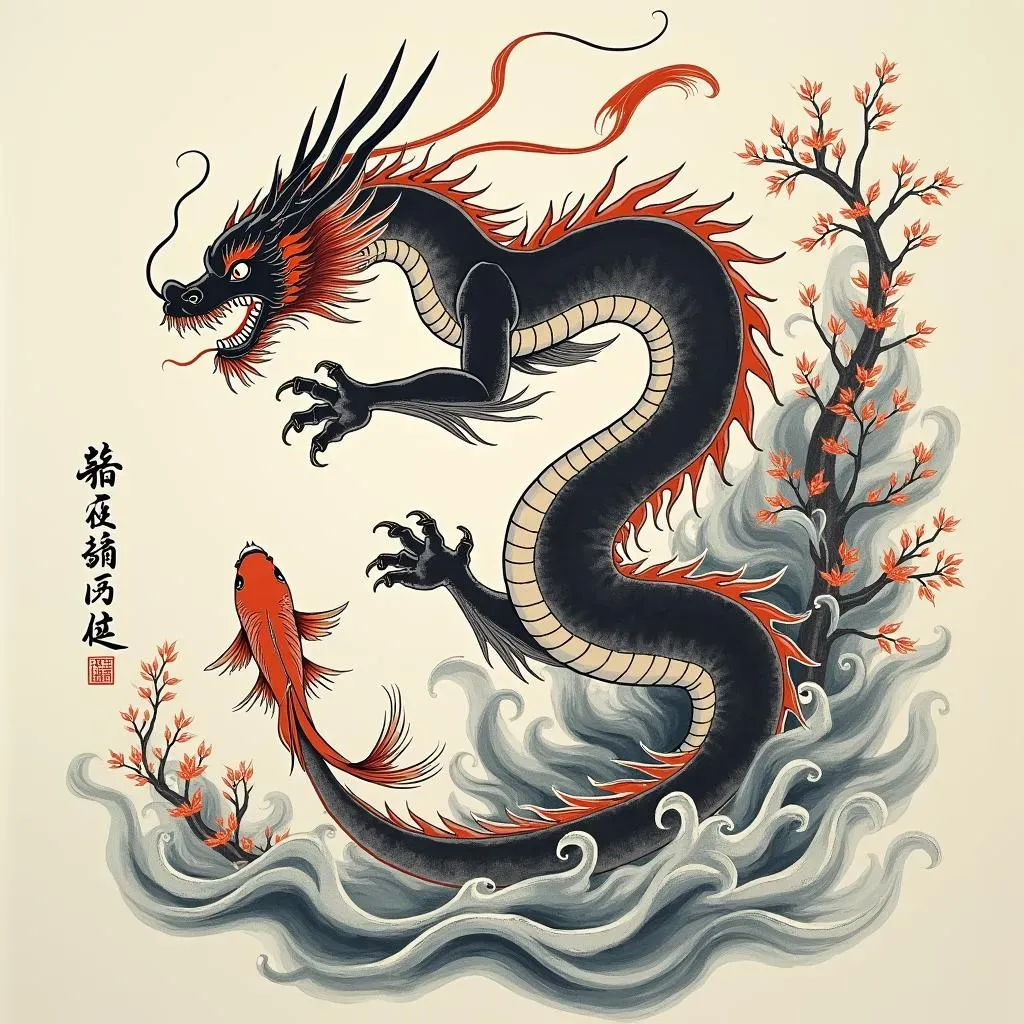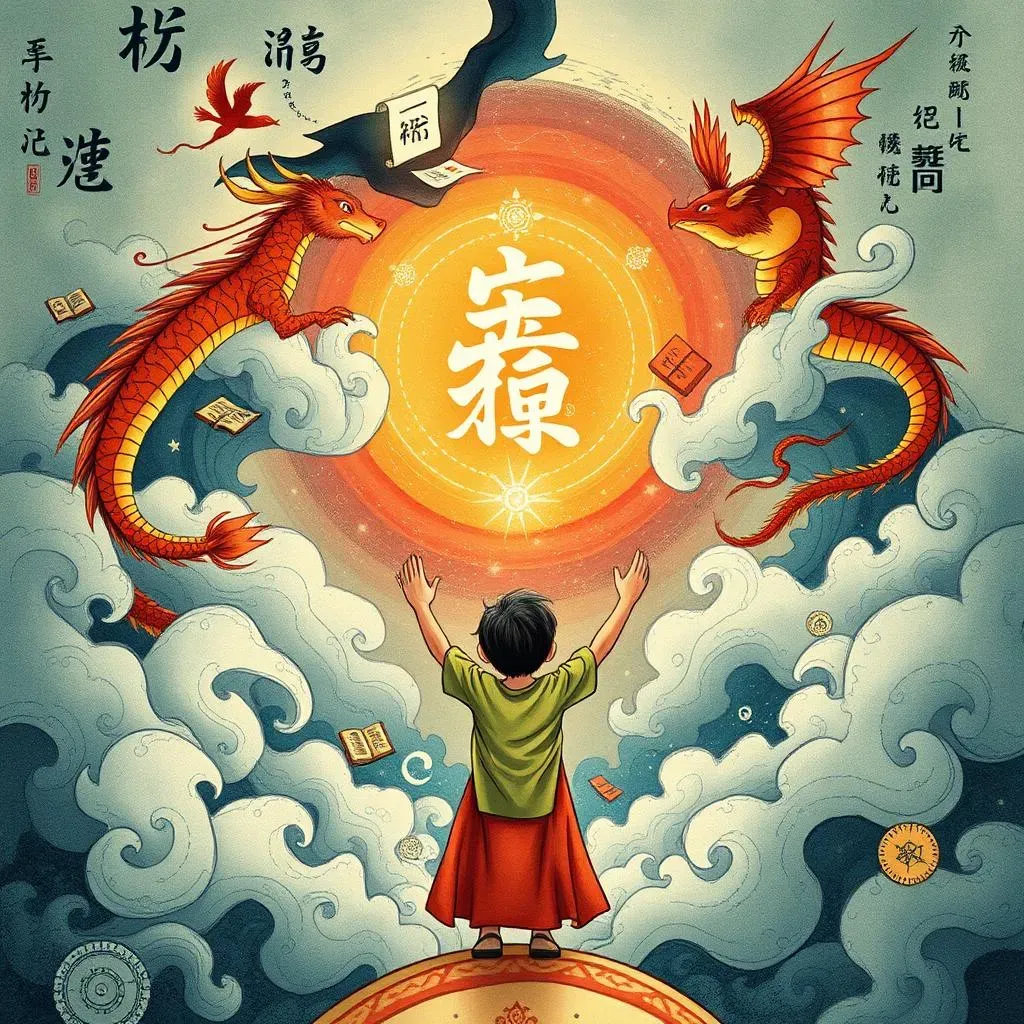Table of Contents
Interested in getting some ink that's both beautiful and meaningful? Look no further than chinese tattoo designs. These aren't just pretty pictures; they're steeped in rich history, symbolism, and cultural significance. From powerful dragons to delicate flowers, each design carries a unique story waiting to be told. But with so many options, how do you choose the right one? This article will guide you through the fascinating world of Chinese tattoo art. We'll decode the symbolism behind popular designs, offering insights into their meanings and origins. We'll also provide practical tips on selecting the perfect characters, ensuring your tattoo accurately reflects your intended message. Ready to explore the elegance and depth of Chinese tattoo designs? Let's dive in and discover the perfect symbol to adorn your skin, reflecting your personality and values with timeless artistry.
Decoding the Symbolism Behind Popular Chinese Tattoo Designs
Decoding the Symbolism Behind Popular Chinese Tattoo Designs
Chinese tattoo designs are more than just skin deep; they're a vibrant language of symbols, each carrying centuries of history and meaning. Understanding this symbolism is key to choosing a design that truly resonates with you. Dragons, for instance, are powerful emblems of strength, wisdom, and good fortune, often associated with emperors and masculine energy. But there's more to it than just that. A dragon clutching a pearl represents wisdom, while a dragon soaring upwards symbolizes ambition and progress. Similarly, the phoenix, a mythical bird reborn from ashes, embodies resilience, transformation, and feminine power. These designs are frequently chosen to signify overcoming challenges and embracing new beginnings.
Beyond mythical creatures, floral motifs also hold significant meaning. The lotus flower, emerging from muddy waters, symbolizes purity, enlightenment, and spiritual awakening. Different colors of lotus flowers carry slightly different nuances, with white representing mental purity and pink associated with the divine. Bamboo, known for its flexibility and strength, represents resilience, integrity, and longevity. Its ability to bend without breaking makes it a popular choice for those who have weathered life's storms. Even seemingly simple symbols like the Chinese character for "strength" (力) can hold profound personal meaning, representing inner fortitude and the ability to overcome obstacles. When selecting a design, consider not only its aesthetic appeal but also the deeper message it conveys. This ensures your tattoo becomes a meaningful expression of your identity and beliefs.
Choosing the Right Chinese Characters for Your Tattoo: Tips and Considerations
Choosing the Right Chinese Characters for Your Tattoo: Tips and Considerations
The Perils of Google Translate
So, you're thinking of getting a Chinese character tattoo? Awesome! But hold up – before you blindly trust Google Translate or some random website, let's talk accuracy. A mistranslated character can turn your "strength" tattoo into "noodle soup" faster than you can say "cultural appropriation." Seriously, I've seen it happen. The internet is a wild place, and not everything you find is going to be spot-on. Take it from someone who learned the hard way that trusting online dictionaries without double-checking can lead to some hilarious (but permanent) misunderstandings. Always consult a native speaker or a trusted translator.
Here's the deal: Chinese characters are nuanced. One stroke out of place can completely change the meaning. Plus, there's simplified vs. traditional characters to consider, and different dialects can use different terms. It's a linguistic minefield! Do you want to take this risk? I don't think so, right? So, before you commit to anything, do your homework. Research, research, research!
Beyond the Dictionary: Context is Key
let's say you've found a character that looks promising. Great! But don't stop there. Words don't exist in a vacuum. You've gotta consider the context. What does this character mean in a sentence? How does it sound? Does it have any negative connotations you should be aware of? For example, a character might have a perfectly innocent literal meaning, but it could also be used in slang or have a historical association you wouldn't want on your body. It's like getting a tattoo of the word "gay" without realizing it used to mean "happy" – awkward, right?
Think of it like this: you wouldn't get a tattoo of a random English word without knowing how it's used in everyday conversation, would you? Same goes for Chinese. Do your due diligence, ask questions, and make sure you're 100% confident in your choice.
Consideration | Why It Matters | How to Check |
|---|---|---|
Simplified vs. Traditional | Meaning can vary | Ask a native speaker |
Contextual Meaning | Slang or negative connotations | Research common usage |
Calligraphy Style | Aesthetic and readability | Consult a tattoo artist |
Finding a Reputable Artist and Verifying the Design
You've chosen your character, you've verified the meaning, now it's time to find an artist. This is where things get real. Don't just walk into any tattoo parlor and hope for the best. Look for an artist who has experience with Chinese calligraphy or Asian-inspired designs. Ask to see their portfolio and pay attention to the quality of their line work. A skilled artist will not only be able to execute the design flawlessly but also offer valuable insights into placement and sizing.
Before the needle even touches your skin, triple-check the design with your artist and, if possible, with a native speaker one last time. It's better to be safe than sorry. A good artist will appreciate your diligence and be happy to make any necessary adjustments. Remember, this is a permanent decision, so don't be afraid to be a little bit picky.
- Check the artist's portfolio.
- Ask about their experience with Chinese characters.
- Verify the final design before the tattoo begins.
The Cultural Significance of Chinese Tattoo Art: History and Traditions
The Cultural Significance of Chinese Tattoo Art: History and Traditions
Ancient Roots and Social Status
Chinese tattoo art isn't some trendy new thing; it's got roots that stretch back centuries, intertwined with the very fabric of Chinese society. Back in the day, tattoos weren't always seen as a cool form of self-expression. In fact, for a long time, they were often associated with criminals, outlaws, and marginalized groups. Think about it: marking someone with a tattoo was a way to identify them as different, as belonging to a certain group – and not always in a good way. But even within these groups, tattoos held significance, serving as symbols of loyalty, bravery, or affiliation.
Over time, though, attitudes towards tattoos began to shift, especially among certain segments of society. Sailors and fishermen, for instance, would often get tattoos for protection against the dangers of the sea. These weren't just random designs; they were carefully chosen symbols believed to ward off evil spirits and ensure a safe journey. Military men would get tattoos of fierce animals to show their courage and intimidate their enemies. So, while tattoos might have started out as a mark of the outcast, they gradually evolved into something more complex, reflecting a range of beliefs, values, and social roles.
Symbolism and Storytelling
What makes Chinese tattoo art truly special is its deep connection to symbolism and storytelling. Every image, every character, every color carries a specific meaning, often drawing from ancient myths, legends, and philosophical traditions. A dragon, as we've discussed, might represent power and good fortune, but it could also symbolize protection or guidance. A koi fish swimming upstream embodies perseverance and the ability to overcome obstacles. Even the placement of a tattoo can influence its meaning, with certain areas of the body associated with different energies and attributes.
These tattoos weren't just about decoration; they were about telling a story – a story about who you are, what you believe in, and what you aspire to become. They served as a visual representation of your identity, a way to communicate your values to the world without saying a word. In a society that placed a high value on tradition and symbolism, tattoos became a powerful means of self-expression, allowing individuals to connect with their cultural heritage and express their unique perspective on life.
Symbol | Meaning | Cultural Context |
|---|---|---|
Dragon | Power, wisdom, protection | Imperial symbol, good luck |
Phoenix | Rebirth, resilience, grace | Feminine power, transformation |
Koi Fish | Perseverance, ambition, success | Overcoming obstacles, good fortune |
Finding Inspiration for Your Unique Chinese Tattoo Designs
Finding Inspiration for Your Unique Chinese Tattoo Designs
so you're ready to get some ink, and you're digging the Chinese tattoo vibe, but you want something that's totally *you*. Awesome! Forget flipping through generic tattoo catalogs. Let's talk about finding inspiration that'll make your tattoo a true reflection of your personality, your passions, and your story. First off, think about what genuinely excites you. What are your hobbies? What are your values? What are the stories that have shaped you? Jot down some keywords and ideas – anything that comes to mind. This is your brainstorming session, so don't hold back!
Once you've got a list of ideas, start exploring. Dive into Chinese mythology, history, and art. Check out ancient poems, calligraphy, and paintings. You might stumble upon a lesser-known symbol or a historical figure that resonates with you deeply. Head to museums, libraries, and online archives. The more you immerse yourself in Chinese culture, the more inspiration you'll find. And don't be afraid to get creative! Maybe you can combine different elements to create a unique design that's entirely your own. The key is to find something that speaks to you on a personal level, something that you'll be proud to wear for years to come.
- Explore Chinese mythology and folklore.
- Research historical figures and events.
- Study Chinese calligraphy and art.
- Reflect on your personal values and experiences.
Embrace the Artistry: Your Journey with Chinese Tattoo Designs
Exploring the world of Chinese tattoo designs opens a door to a realm of profound symbolism and cultural heritage. As you consider your own ink, remember that each design tells a story, connecting you to centuries of tradition and artistry. Whether you choose a powerful dragon, a delicate blossom, or a meaningful character, your Chinese tattoo will be a unique expression of your personal journey and a lasting tribute to this captivating art form. Embrace the process, research diligently, and select a design that resonates deeply with your soul. Let your tattoo be a conversation starter, a symbol of strength, beauty, and the enduring power of Chinese culture.